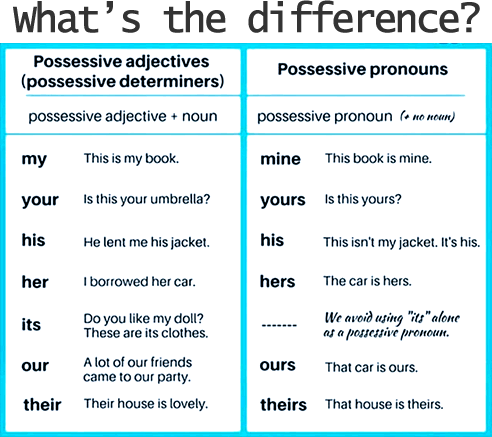
It’s easy to confuse these two sets of words because they are very similar but perform different functions.
Possessive Adjectives
Definition: Possessive adjectives are words that modify nouns to show possession or ownership.
List of Possessive Adjectives:
- my
- your
- his
- her
- its
- our
- their
Examples:
- This is my book.
- Is this your car?
- She likes his new apartment.
- Her dog is very friendly.
- The company increased its profits.
- We enjoy our time together.
- Their children go to the same school.
Usage:
- Possessive adjectives are always followed by a noun (e.g., my book, your car).
- They indicate to whom or to what something belongs.
Possessive Pronouns
Definition: Possessive pronouns are words that replace nouns to indicate ownership or possession directly.
List of Possessive Pronouns:
- mine
- yours
- his
- hers
- its
- ours
- theirs
Examples:
- The book is mine.
- Is this car yours?
- That coat is his.
- The cat is hers.
- The decision is its. (We generally avoid using its alone as a possessive pronoun)
- The house is ours.
- The toys are theirs.
Usage:
- Possessive pronouns stand alone and do not require a noun (e.g., mine, yours).
- They directly show who owns or possesses something.
Key Differences
- Function: Possessive adjectives modify nouns, while possessive pronouns stand alone as replacements for nouns.
- Placement: Possessive adjectives come before nouns, whereas possessive pronouns replace nouns entirely.
- Examples: “This is my house” (possessive adjective) vs. “The house is mine” (possessive pronoun).
Usage Tips
- Use possessive adjectives before nouns to specify ownership.
- Use possessive pronouns when you want to replace a noun to indicate ownership clearly.
- Remember that possessive pronouns do not require a following noun.
If you have any questions or doubts, please ask in the comments or send me a private message.
Follow me on Instagram: @englishyourwaybr
or look for the hashtag #LearnEnglishWithCarlo
